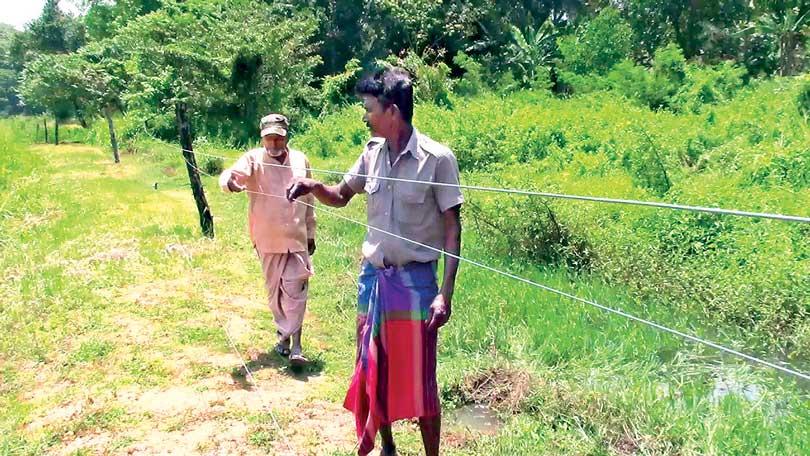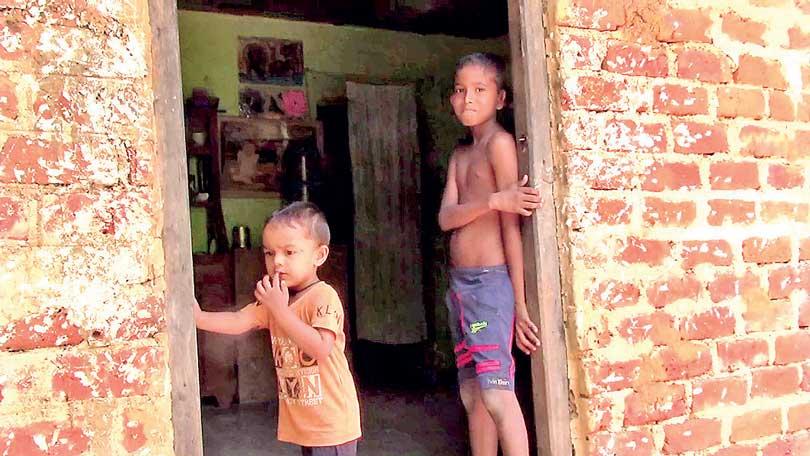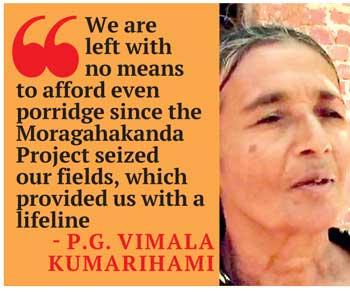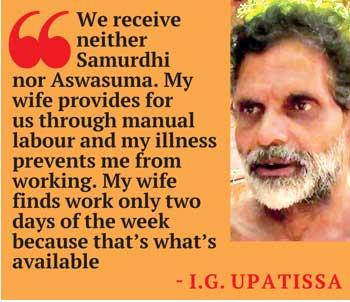02 Apr 2024 - {{hitsCtrl.values.hits}}

Villagers of Moragolla complain that their lands have been captured using an elephant fence which leaves them with no choice, but to engage in manual labour

Moragola children have little food and virtually no schooling
 According to villagers from Naula-Moragolla out of 105 families 80 can afford to have just one square meal a day.
According to villagers from Naula-Moragolla out of 105 families 80 can afford to have just one square meal a day.
This unfortunate circumstance, according to what villagers say, stems from the loss of their paddy fields due to the Moragahakanda Development Project. This was the situation in this village when media personnel visited this village on March 19.
The Moragolla village, situated within the Naula Divisional Secretariat, stands as one of the longstanding settlements neighbouring the Ambangaga basin.
The construction of the Moragahakanda reservoir led to the resettlement of families from six villages within the Naula District Secretariat.
The residents of Moragolla and Galboda villages- which became isolated- were allowed to remain in their villages.
However, the Mahaweli Authority acquired lands, traditionally cultivated by the Moragolla villagers. This resulted in the loss of lands they had tended for years.
 Speaking to the media, residents of Moragolla lamented that they received minimal compensation for their acquired lands. Some families were provided with alternative plots of land in the Kalu Ganga area by the Mahaweli Authority.
Speaking to the media, residents of Moragolla lamented that they received minimal compensation for their acquired lands. Some families were provided with alternative plots of land in the Kalu Ganga area by the Mahaweli Authority.
Villagers said that due to the considerable distance between Moragolla and Kalu Gaga, they are unable to tend to those fields. Consequently, they resort to manual labour to sustain themselves. They added that many children from Moragolla suffer from malnutrition.
Furthermore, villagers asserted that they do not receive any Samurdhi or Aswasuma allowances.
S.M. Kumudu Kumari from Moragolla, weary of issues like inadequate access to drinking water and unreliable bus services for schoolchildren, stated, “We only eat one meal a day. This morning, we had only coconut sambol and rice. Our circumstances are exceedingly difficult. I’ve taken a loan from the Samurdhi Bank, with little hope of repayment. Our paddy fields used to yield 60-70 bushels, but now more than half of it has been taken over by the Mahaweli Authority”.
D.M. Asela from Moragolla village voiced concerns, stating, “We have over 100 families in our village, with about 80 of them living in extreme poverty. Access to drinking water is scarce and bathing forces us to trek into the forest where encounters with elephants are common. Our lands have been captured using an elephant fence, leaving us with no choice, but to engage in manual labour just to secure a meal. Even a simple cup of tea is beyond our means. The elephant fence does not have any electricity. People have become extremely helpless”.
 I.G. Upatissa (60) said, “We are not used to begging. Farming was our livelihood. However, now we face starvation.We receive neither Samurdhi nor Aswasuma . My wife provides for us through manual labour and my illness prevents me from working. My wife finds work only two days of the week because that’s what’s available. Elephants roam even during daytime. With over a hundred families in our village, we ask the authorities to relocate us from this forest which is full of elephants and that’ll allow us to live in peace”.
I.G. Upatissa (60) said, “We are not used to begging. Farming was our livelihood. However, now we face starvation.We receive neither Samurdhi nor Aswasuma . My wife provides for us through manual labour and my illness prevents me from working. My wife finds work only two days of the week because that’s what’s available. Elephants roam even during daytime. With over a hundred families in our village, we ask the authorities to relocate us from this forest which is full of elephants and that’ll allow us to live in peace”.
P.G. Vimala Kumarihami (59) said, “We are left with no means to afford even porridge since the Moragahakanda Project seized our fields, which provided us with a lifeline. The situation has rendered us utterly helpless. While some manage to find work in the garment factory in Kongahawela, we cannot do the same because of our age”.
Allowances discontinued
A.G. Somasiri Bandara, a resident of Moragolla village, said, “I’ve lived in this village since birth. The Moragahakanda Project claimed all our fields which once were our main source of income and now they are left abandoned. Almost every villager survives on just one meal a day. With no access to water or schooling for our children, we’re in dire straits. The threat of wild elephants continues, with two deaths occurring just four months ago within the same day. We have sent letters to the President through the Divisional Secretary, urging him to relocate us. Many young people have already left the village. Health authorities say that children are underweight and warn that they may be suffering from malnutrition. We are requesting  from the President to relocate us from the Moragolla division and allow us to live in another area.
from the President to relocate us from the Moragolla division and allow us to live in another area.
“The Samurdhi allowance we once received has been discontinued with, and now the Aswasuma allowance is being provided to rich families in the village. We are uncertain how the survey was conducted. Only the God above knows the truth. Even during broad daylight, there are elephants in the fields. As a villager and being a parent, I must emphasise that on some days, our children cannot attend school if there is no bus service. The journey by foot to Ambana Maha Vidyalaya is too much of a journey.
“There is no assistance from any institution. All we ask for is to be resettled in a suitable environment, away from the threat of elephants,” he added.
Residents from Alagamuwa, Kambarawa, Galporugolla, Kongahawela, Thalagoda and Siyawala in the Naula Divisional Secretariat were affected by the Moragahakanda-Kalu Ganga Reservoir projects, which mark the final phase of the accelerated Mahaweli Development Project.
Some were compelled to leave their homes as they were residing in the Moragahakanda Reservoir reserve area. Those displaced were provided with compensation based on their places of residence. The Mahaweli Authority not only offered monetary compensation, but also provided transportation, food, drinking water, and other necessities to them to establish new residences in the Kalu Ganga area. To this day, they continue to receive dry rations and water, with the government bearing a significant portion of the expenses.
However, villagers are questioning why the two villages of Galboda and Moragolla, now isolated due to the Moragahakanda reservoir, have not been relocated from their respective areas. The people of Moragolla claimed that the fields they previously worked in are still not submerged, and they believe that being allowed to work on them would provide them with much-needed relief.
The photographer employed by our newspaper captured on reel how the kitchens, once bustling with the preparation of three meals, now lay dormant. This illustrates the plight of those who sacrificed their villages to provide water for others, including future generations.
The children of Moragolla for whom their parents struggle to secure a better tomorrow, were also in their homes when this newspaper made a visit to their village. Those children, with skinny bodies, were waiting half-naked; perhaps thinking that this media team would bring them something to eat.
The children were so skinny that the bones in their chest cavities were visible. Some elderly people watched without saying anything except sighing. Another person sat in a wheelchair and praised the ancient Moragolla. However, the people of Moragolla will not live much longer, being threatened by elephants.
They are not requesting food, but instead demand land to survive; even if it means living on porridge alone.
Therefore, it should be noted that the ultimate plea from the people of Moragolla is for relevant government officials and subject ministers in charge and the President to give immediate attention to this matter.
30 Apr 2024 2 hours ago
30 Apr 2024 2 hours ago
30 Apr 2024 3 hours ago
30 Apr 2024 3 hours ago
30 Apr 2024 3 hours ago